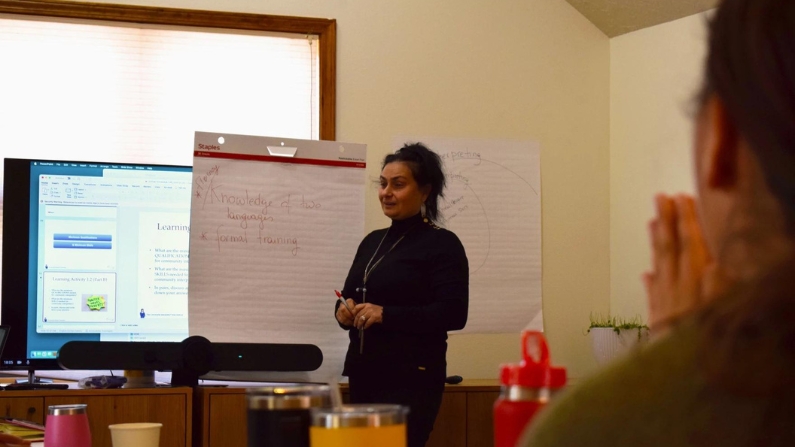Pueden encontrar la versión en español aquí.
As communities in the Mountain West grow, so does the need for Spanish language interpreters. This is especially true in booming resort towns where Latinos power economies — and also need to access services.
Some people, like Celia Perez, are stepping up to fill that language gap.
Perez has been interpreting between English and Spanish in some way since elementary school.
“I didn’t really realize the difference in languages at home and school,” she said, sitting on a brown suede couch in her Victor, Idaho apartment.
She said she moved to the region in the Tetons back in the 1990s. She was part of a generation born in Mexico but raised in the U.S.
“I spoke both languages and my mom understood me,” she said. “I grew up a little more, and I noticed like she needed help at the store or my dad needed help with asking for something.”

Celia Perez in her apartment in Victor, Idaho. She’s starting a new interpreting business called Teton Language Services. (Hanna Merzbach / Wyoming Public Media)
Now, Perez has five kids of her own — all boys — and this language skill has grown into a full-blown career. She’s been trained in community and medical interpreting and is starting her own business, Teton Language Services.
She said it’s especially needed since local nonprofits estimate the region’s population to be about 30% Latino.
“If I have the capacity to help somebody then why not?” Perez said.
Across the Tetons in Jackson, Wyoming, Giovanna Carriero-Contreras said the industry has become a lot more professional, as more people pick up the craft.
She’s based near Denver, but has spent her career traveling around the country training people on all kinds of interpreting.
“So it’s not only listening,” she told a class in Jackson. “It’s active listening.”
Carriero-Contreras paced around a conference room on the first day of a week-long training session. She was speaking to 12 bilingual health workers, police officers, and airline and hotel staffers.

Giovanna Carriero-Contreras leads a community interpreter training at One22 Resource Center, a nonprofit which helps provide language access in Jackson, Wyoming and organizes these trainings. (Hanna Merzbach)
She said what they’ve been doing so far is simply repeating what someone has said, but that’s not enough.
“There are a lot of cognitive processes that happen at the brain level before we are able to do it,” she explained.
That means understanding regional dialects and not just saying what someone said but saying it how they said it. These are things that Google Translate or someone who’s bilingual and hasn’t had any training might miss.
With more people taking trainings like these, interpreting businesses have popped up everywhere from Salt Lake City to Sante Fe.
Over on Colorado’s Western Slope, Antonio Rodriguez has been interpreting for local governments and nonprofits in the Telluride area for about six years. For him, interpreting is all about language justice.
“Like you can speak in the language that you are born or the language of your heart,” Rodriguez said.

Antonio Rodriguez lives in Montrose, Colorado. He’s been providing interpreting services there, in Telluride and around the region since 2018. (Hanna Merzbach / Wyoming Public Media)
For immigrants like him, he said it can be hard to express your thoughts in government meetings and other public settings.
Interpreting helps, but he said local officials also need to do more outreach to Latino communities.
“They think because there is going to be an interpreter, all the work is done, and I’m like, ‘No, you really need to make that connection,’” he said.
Back in the Tetons, Blanca Moye has been doing that outreach with social service organizations for over 20 years.
“[There’s] always someone looking for help, and I always raise my hand,” Moye said, laughing, sitting in the lobby of the Teton County Public Library.
She said in the ’90s that included interpreting for police when they pulled over Spanish speakers. She’s currently the bilingual coordinator for an affordable housing advocacy nonprofit, providing interpretation at live events.

Blanca Moye interprets a live Shelter JH event at the episcopal church in Jackson in early 2024. She quietly speaks Spanish into a microphone, and a handful of people wearing headphones can hear her. (Hanna Merzbach / Wyoming Public Media)
Nowadays, she said there’s a lot more formal processes and interpreters stepping up to help. Still, the need for language access is ever present at private companies and organizations, and with people moving here all the time for work and a way of life.
Interpretation is still needed even for the longtime residents, Moye said.
“They still need help, you know, because they just spend the time working.”

A handful of people listen to Blanca Moye’s Spanish interpretation through headphones at the live Shelter JH event in Jackson. This is a common way to provide simultaneous interpretation. (Hanna Merzbach / Wyoming Public Media)
This story was produced by the Mountain West News Bureau, a collaboration between Wyoming Public Media, Nevada Public Radio, Boise State Public Radio in Idaho, KUNR in Nevada, KUNC in Colorado and KANW in New Mexico, with support from affiliate stations across the region. Funding for the Mountain West News Bureau is provided in part by the Corporation for Public Broadcasting.






